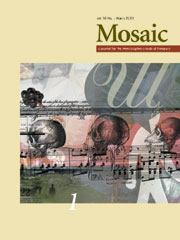Issue 36.1
Overview

General Issue
Published: March 2003
View the issue introduction or see the issue summary and contents below.
11 essays, totalling 192 pages
$15.00 CAD
An interview with Canadian scholar and author Aritha van Herk opens this general issue of Mosaic. “Crossings,” the title given to the journal’s new series of interviews, is central as a theme for many of the ten essays that follow: they examine crossings of and/or between self and identity, of media and medium, of space and race, and of fiction and genre.
Crossings: An Interview with Aritha van HerkDawne McCance The following interview with Aritha van Herk, distinguished Canadian writer and critic, took place on 29 March 2002 in the John Snow House, Calgary, Alberta. Mosaic is pleased to publish the interview here. | |
The Displaced Self: The Experience of Atopia and the Recollection of PlaceDenis B. Walker Within a theoretical framework derived from Heidegger, Henri Lefebvre, and others, this essay investigates the way in which the sense of psychological displacement that attends the experience of spatial displacement (what Roland Barthes calls atopia) is repaired by the self-conscious recollection of the places of one’s past. | |
L’ombre du lecteur: Interaction et lectures narrative, policière, et hyperfictionnelleRené Audet et Richard Saint-Gelais Cet article examine divers avatars de la lecture narrative: celle du récit minimal, du récit policier, et de l’hyperfiction. L’interactivité n’étant pas spécifique à l’hyperfiction, on propose plutôt un modèle basé sur les processus et les variations des réglages de la lecture. | |
“Black Comme Moi”: Boris Vian and the African American Voice in TranslationStephanie Brown In 1946, Boris Vian published a faux-French translation of a novel by a non-existent African American author. Emphasizing through parody and self-referentiality the “impossibility” of translation from American English into French, Vian simultaneously attacks both the notions of a constructed, fetishized “original” text and of racial authenticity. | |
Stephen Maturin in the Age of Lamarck: A Fictional Restoration of CuvierWayne Glausser Patrick O’Brian’s novels reflect the polymorphous epistemological scene of early-nineteenth-century natural philosophy. He makes the character Stephen Maturin not a proto-Darwinian but an advocate of the neo-classical paradigm articulated most influentially by Georges Cuvier. Maturin confronts the most vexing puzzles for the traditional model, including extinction of species, but never loses his faith in fixity and design. | |
“No Trace of Presence”: Tchaikovsky and the Sixth in Forster’s MauriceBret L. Keeling Tchaikovsky and his Sixth Symphony have two distinct functions in E.M. Forster’s Maurice. The composer and composition serve as a strategy of disclosure for Clive Durham as he woos Maurice Hall, and may provide evidence of the ways that music, like literature, can take part in individual and social formations. | |
The Princess and the Pricket: Love’s Labour’s Lost on the Problem of WillHarvey Birenbaum Preparing to hunt deer, the French Princess expresses the predicament that motives and satisfactions contradict each other in a split between will and pride that makes human effort self-defeating. Gentlemen pursue the paradox of “self-fashioning,” which the ladies’ ironies reduce to a sense of immediacy from which personality, within meaningful grace, must emerge anew, when will, at the end, is suspended. | |
Looking for Roots: Curandera and Shamanic Practices in Southwestern FictionJane Robinett Arguing that the relationship between native American and Mexican American cultures has often been ignored, this essay explores connections between cultures by focussing on traditional healing practices. These practices, evident in the fiction of Leslie Marmon Silko, Rudolpho Anaya, and Ana Castillo, reveal origins in Aztec and Mayan medicine. | |
Fritz Lang’s Mediaevalism: From Die Nibelungen to the American WestMartin M. Winkler This essay relates Fritz Lang’s mediaeval epic film Die Nibelungen to the three Western films he made in Hollywood. In particular the last of these, Rancho Notorious, reworks the theme of “fate, murder, and revenge,” which is fundamental not only to Die Nibelungen but also to Lang’s work as a whole. | |
Starving for Hunger: The Fiction of Anzia YezierskaNieves Pascual From mediaeval saints to modern anorectics, starvation has been a pretext and a stimulant for literature. This essay focusses on Anzia Yezierska’s obsession with hunger, which was greedily charged with cultural, spiritual, and aesthetic valences. Yezierska wrote to keep her feeling of hunger aroused. | |
Double Perspective: The Silent Traveller in the Lake DistrictDa Zheng Through its analysis of the thematic, aesthetic, and literary aspects of Chiang Yee’s The Silent Traveller: A Chinese Artist in Lakeland, this essay argues that the salient feature of double perspective reflects the cultural sensitivity of the diasporic Chinese poet and artist, his search for a new language of expressions, and his longing for home-returning. |